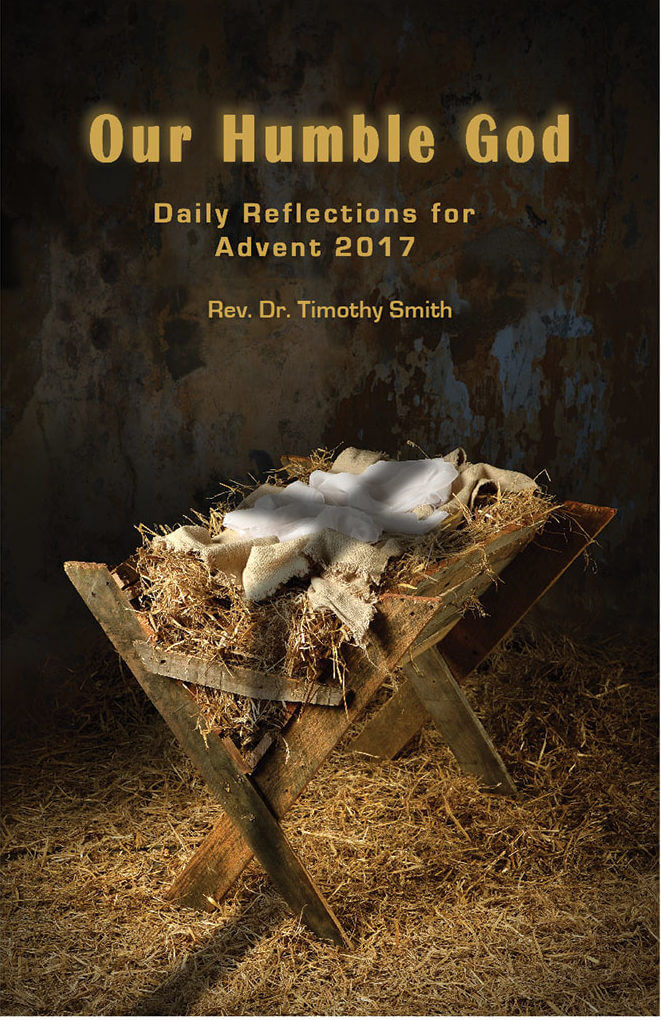PRAY:
Settle yourself into prayer and get ready to reflect on the Word of
God.
READ:
Let the same mind be in you that was in Christ Jesus, who,
though he was in the form of God, did not regard equality
with God as something to be exploited, but emptied himself,
taking the form of a slave, being born in human likeness.
And being found in human form, he humbled himself and
became obedient to the point of death — even death on a cross.
Philippians 2:5-8
Long before I saw one in a store or online, my mother created her own: a Christmas Nail for holiday decorating. She made the Christmas Nail from a six-inch nail and some red ribbon, hanging it by wire on her front door. From Thanksgiving on, the Christmas Nail generated lots of conversation when people came to visit. My mom always looked for opportunity to remind people “the reason for the season”. She would sometimes tear up in the telling; saying, “Jesus came to die for us!”
Unlike the rest of us for whom death is inevitable, Jesus had the complete freedom to choose not to die. But Jesus made the choice to lay down His life for us so that we might forever share life with Him. Scripture is emphatic in saying that Jesus did not die an ill-fated victim of circumstances. Rather, Jesus chose to die, to deliberately lay down His life for us. “I lay down my life,” Jesus said, “in order to take it up again. No one takes it from me, but I lay it down of my own accord” (John 10:17-18; see also 10:11, 15b).
God’s boundless love could not be contained within the Godhead but overflowed down to us. Jesus would not exploit or take advantage of His deity, but came down the rungs into human likeness and excruciating death. God humbled Himself and became “obedient to the point of death — even death on a cross.”
The humble love that marked Jesus’ entire life finds its defining expression in His death on the cross. He who is fully equal with God the Father and Spirit, most perfectly revealed the truth about God in humble love poured out on the cross.
The Son of God’s humble, self-giving love is illustrated in the sign that the angel gave to the shepherds: “This will be a sign for you: you will find a child wrapped in bands of cloth and lying in a manger” (Luke 2:12). Here are two identifying features, setting Jesus apart from all other babies born in Bethlehem or surrounding Judea. The shepherds would find the Christ wrapped in bands of cloth and lying in a barnyard feeding trough. That would be a most unusual and unexpected “sign” pointing to Messiah’s birth. There are various ways to interpret the sign given to the shepherds, but Bible scholar J. Dwight Pentecost makes this intriguing observation:
He was in a manger. No royal garments clothed His body, rather, he was wrapped in strips of cloth. This baby had the appearance of being prepared for burial. How fitting that He should be so seen from the time of His birth, since He truly had been appointed to death! (The Words and Works of Jesus Christ)
Jewish scholar Arnold Fruchtenbaum adds this helpful, historical note:
On the first day of his life he was wrapped with the same kind of cloth that they will wrap him in again on the last day of his life, with burial cloth. And that shows the purpose of his birth. All of us here were born to live. This one here was born to die, and it is signified by being wrapped in burial cloth. (The Life of the Messiah in His Jewish Context)
Yes, Jesus was born to die! Over His cradle there looms the frightening shadow of the cross. Yet, the cradle and the cross reveal that God’s nature is to give Himself for others and hold nothing back. That is the core of the divine nature. It is the mind of our humble God!
REFLECT:
- The apostle Paul says, “God proves his love for us in that while we were still sinners Christ died for us” (Romans 5:8). What does God giving His Son to die for you say about God’s love for you? Take a few moments to talk with Jesus about this.
“The crucial significance of the cradle at Bethlehem lies in its
place in the sequence of steps down that led the Son of God to the
cross of Calvary, and we do not understand it except in this context.”
J. I. Packer, Knowing God



